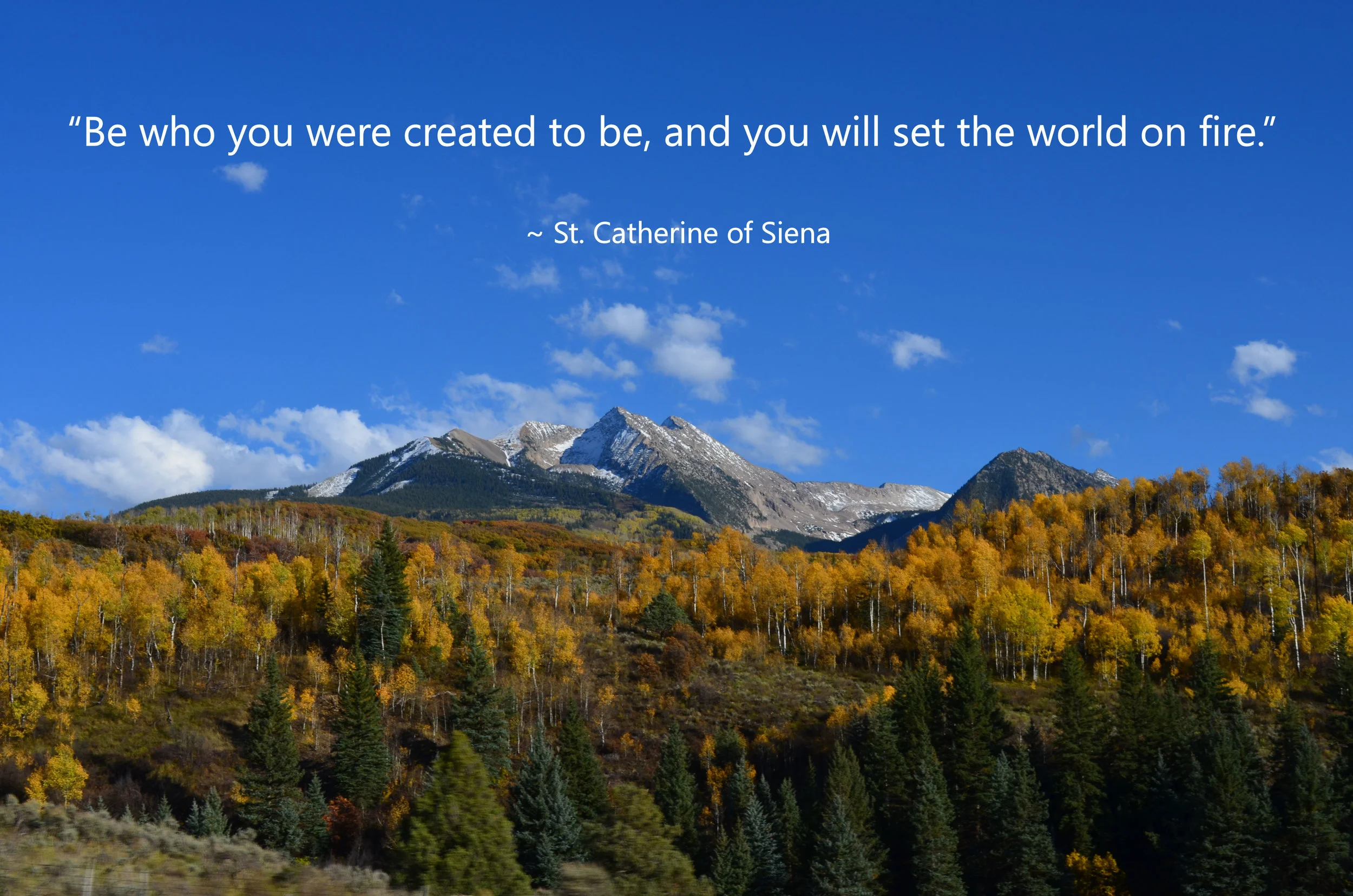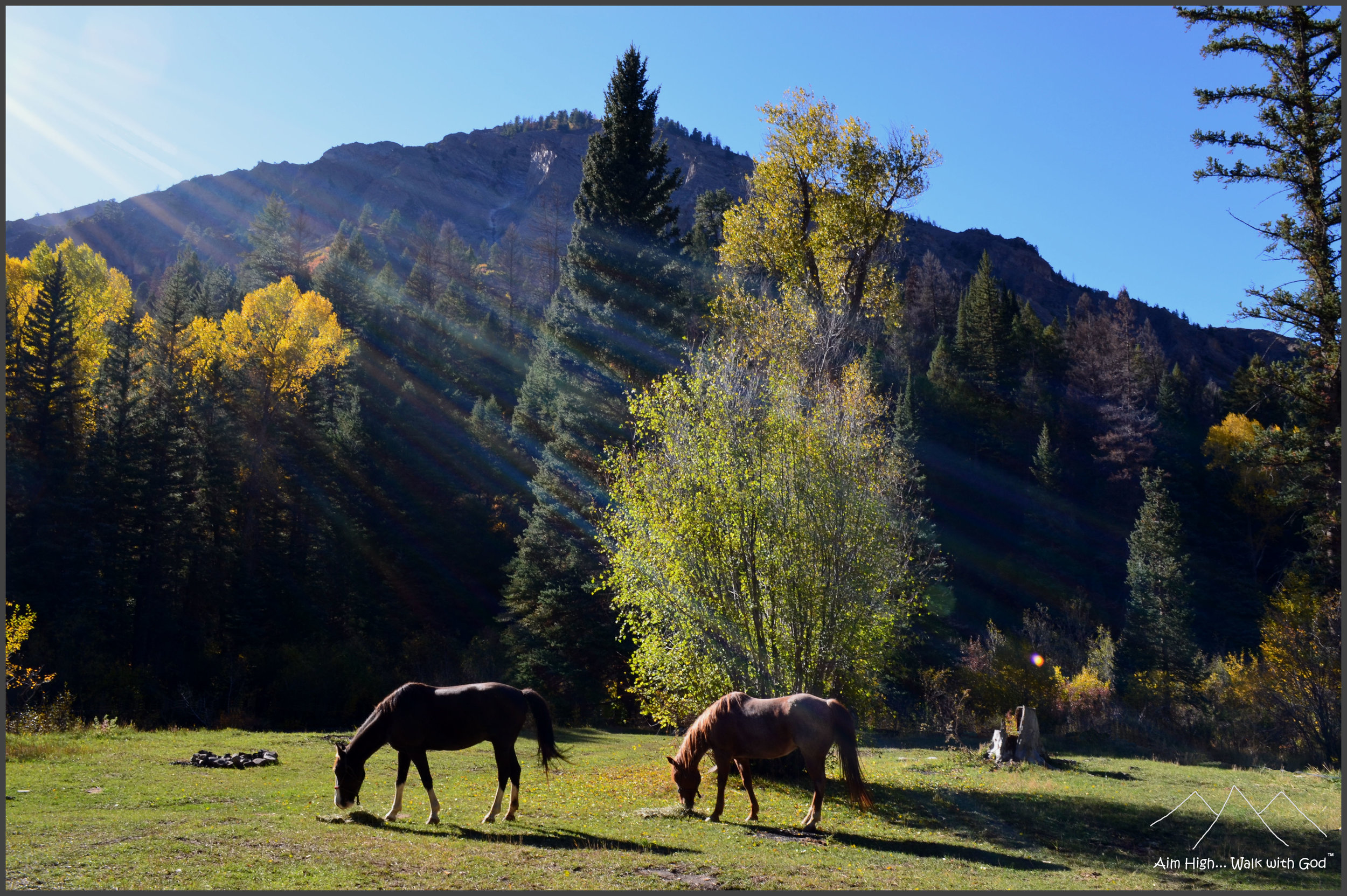Argiope Spider with Monarch Butterfly, Fredericksburg, TX
Posts
Set the World on Fire
Aspen trees on fire with fall colors, Mt. Daly, Colorado
Catherine of Siena certainly set the world on fire. It is hard to believe what this simple peasant girl accomplished in her short life in the 14th century. She was a mystic, care-giver to the poor, adviser of noble men and adviser to the pope. St. Catherine of Siena was given the title Doctor of the Church in 1970 by Pope Paul VI. The link below has more information about St. Catherine.
Jesus - a song in the heart
Honeybee on Cholla Cactus flower, Spring Branch, TX
The name “Jesus” whispered into our hearts and minds throughout the day, St. Bernard of Clairvaux reminds us, is a beautiful simple prayer.
The Mark
Western Meadowlark, Pueblo West, CO
“This is how all will know that you are my disciples, if you have love for one another.” (John 13:35)
“Beloved, let us love one another, because love is of God; everyone who loves is begotten by God and knows God.” (I John 4:7)
“In this way we know that we love the children of God when we love God and obey his commandments. For the love of God is this, that we keep his commandments. And his commandments are not burdensome” (I John 5:2,3)
“Let the man truly possessed by the love of Christ keep his commandments.” St. Clement I, pope AD 89 -99.
Never Lost
Badlands National Park, South Dakota
Blessed Sara Salkahaz was never lost, her love of Jesus always guided her path. A tireless worker for the poor, when the Nazis arrived and occupied Hungary; Sara hid many Jews and others being sought by the Nazis. Sara was murdered by the Nazis on December 27, 1944. Sara now resides with the one she loves.
The following is an excerpt from Blessed Sara Salkahaz’s spiritual diary.
To love, even when it is difficult, even when my heart has complaints, when, I feel rejected! Yes, this is what God wants! I will try; I want to start – even if I would fail – until I will be able to love. The Lord God gives me grace, and I have to work with that grace. – Blessed Sara in her spiritual diary
The following website contains more information on the life of Blessed Sara Salkahaz.
Merry Christmas
White-tail Doe and fawns, Spring Branch, Texas
During this Christmas season may we follow Mary’s example and ponder the miracle of miracles; that God became man, so that we may see His face, so that we may know Him, so that we might share life with him abundantly and eternally.
“And Mary kept all these things, reflecting them in her heart.” Luke 2:18
God's Grace
God’s grace is all around us. His grace touches us in the people we know, the beauty that surrounds us, in every beat of our hearts. God’s Grace touches us in the Church, in the Word of God, in song, and in a special and unique way in the sacraments. Let us participate in God’s grace for “grace is a participation in the life of God” (Catechism of the Catholic Church Paragraph #1997).
Prayer and the Dance of the Butterfly
Pipevine Swallowtail Butterfly on Purple Sage, Spring Branch, Texas
Butterflies are such great creations of our Lord. So beautiful and I just love their dance. All day long they fly up and down and all around, going from one flower to the next, in such a joy-filled dance. Perhaps we can learn from the butterflies dance.
If we live a life of prayer, meeting with our Lord, enjoying the sweet nectar of the sound of his voice; perhaps we too will want to dance to and fro, up and down, showing all who see us our love of God, our love of man, and our love of all of God’s creation.
Meek like a horse?
West Elk Wilderness, Colorado
Have you ever just sat and watched a horse? Have you ever rode a well-trained horse? They are magnificent creatures. Such strength, such power but even more amazing is the self-control of a well-trained horse. Allowing a person to sit on-top of its back is not natural for a horse but a well-trained horse gladly succumbs to the demands of his master, using his strength, speed, and agility as the masters commands.
The ancient Greeks had a word to describe this behavior, the behavior of a well-trained horse, it was praus. Praus has been translated in English to meek. The old English often used the term “meeking a horse”. Meeking a horse did not mean to to strip the power from a horse but rather to harness the horse’s power from a state of wild independence to one of loyalty so that the horse could be used as the master of the horse intended.
In the gospel of Matthew we see the gospel writer translate Jesus’s words (likely spoken in Aramaic) into ancient Greek. During Jesus’s Sermon on the Mount the word “praus” is mentioned as a characteristic of those that will inherit the earth. Jesus says, “Blessed are the meek, for they will inherit the earth.” (Matthew 5:5) Today many people think the word “meek” in this New Testimony writing describes a person that is that is week and submissive to everyone.
In light of the meaning of the ancient Greek word “praus” or “meek” what is meant by “blessed are the meek”? I think it is best to look at the life of Jesus. Saint Paul uses the word “praus” when he speaks of “the meekness and gentleness of Christ…” (2 Corinthians 10:1). Christ was “meek” in that he was submissive to the will of his heavenly father at all times.
When Jesus calmed the sea (Matthew 8:23-27), he certainly was exuding tremendous outward power but he was still meek as he was doing the will of his heavenly father.
When Jesus confronted the people wanting to stone the adulteress (John 8: 1-11) he demonstrated tremendous compassion and courage but he was still meek as he was doing the will of his heavenly father.
When Jesus restrained his outward strength, actually demonstrating great inward strength, by being beaten and humiliated and dying on a cross. He was still meek doing the will of his heavenly father.
Are you meek? Are you submitting your intelligence, your strength, your power, all of your talents; and even your weaknesses, to do the will of your heavenly father?
Original Source of Beauty
West Elk Wilderness, Colorado
It was Good
Bull Elk, Rocky Mountain National Park, Colorado
Love is the color of life
Autumn Colors, West Elk Wilderness, Colorado
Let us pray, that through God’s grace, we might allow God to paint our lives in such a way as to bring glory to the Kingdom of God.
The Pattern of our Lives
Autumn Leaves, Gifford Pinchot National Forest, Washington
A virtue is an habitual and firm disposition to do the good. It allows the person not only to perform good acts, but to give the best of himself. The virtuous person tends toward the good with all his sensory and spiritual powers; he pursues the good and chooses it in concrete actions. – Catechism of the Catholic Church- 1804
Aim High
Autumn Colors, West Elk Wilderness, Colorado
Fly into the arms of our Lord
White Pelican, Inks Lake State Park, TX
Kingdom of Heaven
Life’s Greatest Adventure
Inks Lake State Park, Texas
Our Father Waits
Palo Duro Canyon State Park, Texas
In reflecting on the story of the prodigal son (Luke 15:11–32), Pope Francis has said about God, “He waits. Always. And it is never too late. That’s what he is like, that’s how he is…he’s a father. A father waiting at the doorway, who sees us when we are still far off, who is moved, and who comes running toward us, embraces us and kisses us tenderly.” (The Name of God is Mercy, Pope Francis, pages 51-52)
Be Still
Stellar’s Jay, State Forest State Park, Colorado
Get Up
Five-point American Bull Elk in velvet laying down and taking it easy on a warm afternoon in Rocky Mountain National Park, Colorado



















